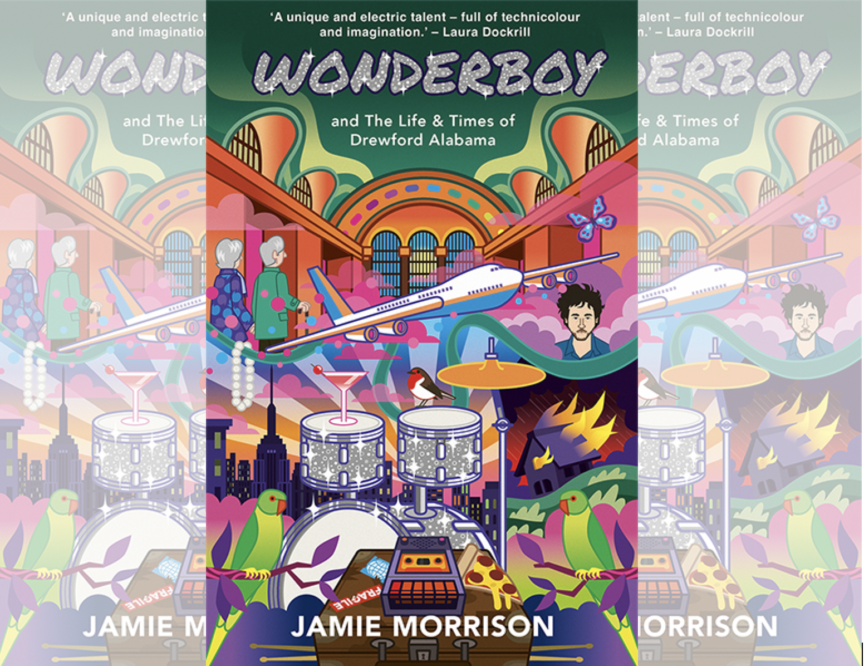Book review: Wonderboy, and the Life and Times of Drewford Alabama by Jamie Morrison

Niall Griffiths
Ah, the rockstar memoir, of which there’s been a plethora in recent years (isn’t there always a plethora?); Sean Ryder (interesting, funny), Mark E Smith (just as interesting, a bit less amusing), Morissey (ick), Slash (mad), etc. Is Wonderboy a memoir, though?
It’s being promoted as fiction, but the writer is a drummer (once of the Stereophonics) and his protagonist, the ‘Wonderboy’, is the same. So let’s call it semi-autobiographical fiction, then. Or faction. Or whatever. It doesn’t really matter
Drums
Category issues aside, the book is, to be honest, a bit of a mess. I also found it a tad cringe-inducing at times. It’s basically the story of a man obsessed with drums, an obsession which he gradually transfers to the unknown author of a found artefact, one Drewford Alabama.
Synchronicities and coincidences abound. We leap between 1980s Surrey and 2012 London, with sojourns in various other countries in between. The ‘I’ undergoes a spiritual journey too, through addictive behaviours and fixations to some place of calm. We see some of his diary extracts.
Breezy
The chapters are headed Year, Location, and Mood (a neat device), the style is breezy and chatty, there are entertaining digressions (into the best breakfast foodstuffs, for instance), it very much has the feel of bar small talk, but oh, the clichés! Avoid as much as possible! ‘Cheap and cheerful’, ‘back in the hot seat’, ‘first things first’, ‘have our cake and eat it’, ‘passed with flying colours’…just typing these phrases makes me want to snip my own fingers off with secateurs.
Quotidian speech is held together by cliché, I know this of course, but this is writing and thus available to revision and re-phrase. And it is not without its beauties: the comparison of America to water, for example, is an intriguing and original one, as is the revelation that visits the narrator when he’s suffering from the galloping shits in India.
Obsession
There’s not enough of the Drewford Alabama stuff, which is the most interesting aspect of this book. I understand why it’s included – the transposition of obsession, the temporary vacation from the ego’s demands that intoxicants once supplied – but this is, to my mind, under-examined; it vanishes from long sections of the text during which, in a bitter irony, the narrator’s ego is foregrounded, over-weeningly, exasperatingly.
Debauchery
We’re told a lot about debauchery and binges and the like, but rarely do we see telling details, and never are we offered glimpses into how particular drugs worked on the narrator: how, say, heroin made him feel, how crack made him feel. Maybe this is deliberate self-censure, but, to this reviewer, it leaves a hole in the narrative.
Plus, on several occasions, I was reminded of the Jarvis Cocker lyrics, ‘still you’ll never get it right/when you’re laid in bed at night/watching roaches climb the wall/because if you phoned your dad he could stop it all’, not least in the whinge about affluenza (in which we’re informed that ‘all that glitters is not gold’), and the moment when he reveals that he could, had he not been too proud to ask, pressed his parents and/or grandparents to help him out of a financial hole (ignoring a lifebelt, for whatever reason, does not equate to the absence of a lifebelt in the first place).
Well, there are some inspiring phrases: the workers of London, for instance, ‘heading out to their day of hard graft and soft procrastination’. That’s good.
Sober
The sober philosophising in the book’s closing chapters is, to be honest, of the ‘live/laugh/love’ sort and had me burning to return to Frankl, Eagleton, Holloway (and heroin, I admit, although I resisted). Still, I’m glad the narrator (and writer?) found sobriety, and the beauty of a cloud is not to be underestimated. To sum up: if you like the Stereophonics, you’ll like this book.
Support our Nation today
For the price of a cup of coffee a month you can help us create an independent, not-for-profit, national news service for the people of Wales, by the people of Wales.






Haven’t read the book so I’ll have to reserve judgement but it’s refreshing to see a genuinely critical approach as opposed to the blanket approval which seems to dominate these pages.
Sounds great !